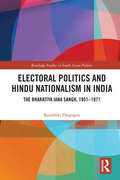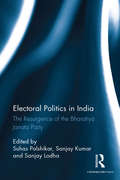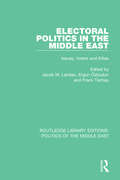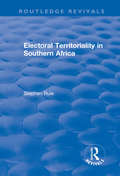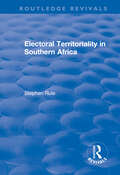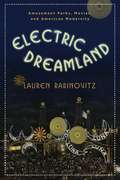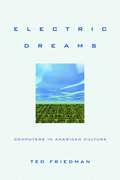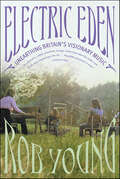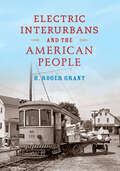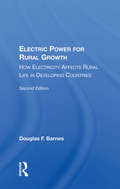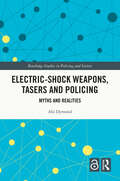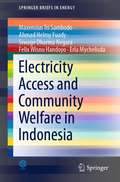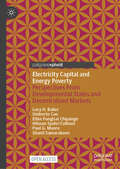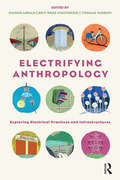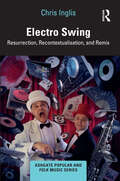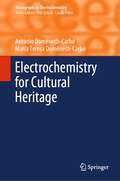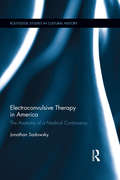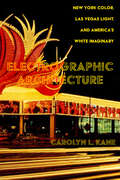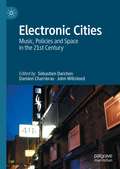- Table View
- List View
Electoral Politics and Hindu Nationalism in India: The Bharatiya Jana Sangh, 1951–1971 (Routledge Studies in South Asian Politics)
by Koushiki DasguptaThis book analyses the rise and growth of the Hindu nationalist party Bharatiya Jana Sangh in post independent India, tracking the electoral journey of the party from 1951 to 1971. Offering a comprehensive analysis of the party Bharatiya Jana Sangh - its origin, ideas and electoral performances in the first two decades of its journey - the book provides an overview of the state-wise electoral record of the party mobilizing Hindu support and managing factional disputes. It surveys the issues of conflicts between the intraparty factions dominated by the recruits from the Rastriya Swayamseyak Sangh and the others. The author also presents a critique of the Hindutva politics of the Bharatiya Jana Sangh on account of its somewhat imperfect appeal among the masses and its problems in raising real issues of socio-economic concern. With a special emphasis on the states situated outside the Hindi language belt of Northern India, the electoral outcome of the Jana Sangh during each national and state legislative elections are analysed. Based on the dialectics of ideology and exigency, this book makes a thorough investigation of the leadership-succession crises in the party, patterns of vote sharing at the regional level and trends of coalition with the non-Congress parties in the states. Providing a nuanced understanding of the processes leading to the strengthening of right-wing political parties in India, the book will be of interest to academics working in the fields of nationalism, party politics and South Asian Politics.
Electoral Politics in India: The Resurgence of the Bharatiya Janata Party
by Sanjay Kumar Suhas Palshikar Sanjay LodhaThe general elections held in 2014 in India — the largest democracy in the world — to elect the 16th Lok Sabha brought in dramatic results. This important volume explains not only the startling victory of the Bharatiya Janata Party (BJP) but also the equally surprising downfall of the Congress Party. It examines not why BJP won and the Congress lost, but why the scale of BJP’s victory and that of Congress’s defeat was so very different from the results in the years 2004 and 2009. The volume presents an in-depth analysis of the electoral results, state-wise studies, the factors leading up to these outcomes, and the road India has travelled since then. With contributions from India’s leading political scientists, psephologists, sociologists and political commentators, this book will be of great interest to scholars and researchers of Indian politics, democracy and political parties, as well as South Asian studies.
Electoral Politics in the Middle East: Issues, Voters and Elites (Routledge Library Editions: Politics of the Middle East #10)
by Jacob M. Landau Frank Tachau ErgunComparative political study of the Middle East got off to a late start. Unlike any previous studies in comparative politics, this book, first published in 1980, represents an important methodological advance in that it proceeds by themes rather than by countries, and uniquely focuses on three major aspects of electoral politics in three contemporary Middle Eastern states. The three countries – Turkey, Lebanon and Israel – are chosen because they are the only Middle Eastern countries with a tradition of free elections. On the other hand, they also display certain characteristics found in other, non-competitive Middle Eastern political systems, such as the role and prominence of religion. The study is based on extensive original research and presents the first comparative treatment of electoral issues, voting behaviour and parliamentary elites, emphasising the context of rapid socio-economic change – a theme particularly pertinent to those countries with their tradition of free elections. The variety of political behaviour within the countries concerned, coupled with the prevailing complexities resulting from disparities in language and cultural inheritance, makes the comparative approach particularly revealing. The attitudes and behaviour of the voters can be seen to be at least as important as the laws and mechanisms involved.
Electoral Territoriality in Southern Africa (Routledge Revivals)
by Stephen RuleThis title was first published in 2000. A comprehensive comparison of voting patterns in seven countries of Southern Africa. The modern democratic electoral histories of Botswana, Lesotho, Namibia, South Africa, Swaziland, Zambia and Zimbabwe are placed within the contexts of their pre-colonial and colonial polities. The extent to which urbanization and the regional distribution of language, ethnicity and race impacts on the electoral geography of the sub-continent is demonstrated statistically and cartographically. The analysis is complemented by anecdotal evidence gathered during personal interviews and discussions with voters, politicians, government officials and academics.
Electoral Territoriality in Southern Africa (Routledge Revivals)
by Stephen RuleThis title was first published in 2000. A comprehensive comparison of voting patterns in seven countries of Southern Africa. The modern democratic electoral histories of Botswana, Lesotho, Namibia, South Africa, Swaziland, Zambia and Zimbabwe are placed within the contexts of their pre-colonial and colonial polities. The extent to which urbanization and the regional distribution of language, ethnicity and race impacts on the electoral geography of the sub-continent is demonstrated statistically and cartographically. The analysis is complemented by anecdotal evidence gathered during personal interviews and discussions with voters, politicians, government officials and academics.
Electric Dreamland: Amusement Parks, Movies, and American Modernity
by Lauren RabinovitzLauren Rabinovitz describes the urban modernity engendered by these parks and their media, encouraging ordinary individuals to sense, interpret, and embody a burgeoning national identity.
Electric Dreamland: Amusement Parks, Movies, and American Modernity (Film and Culture Series)
by Lauren RabinovitzAmusement parks were the playgrounds of the working class in the early twentieth century, combining numerous, mechanically-based spectacles into one unique, modern cultural phenomenon. Lauren Rabinovitz describes the urban modernity engendered by these parks and their media, encouraging ordinary individuals to sense, interpret, and embody a burgeoning national identity. As industrialization, urbanization, and immigration upended society, amusement parks tempered the shocks of racial, ethnic, and cultural conflict while shrinking the distinctions between gender and class. Following the rise of American parks from 1896 to 1918, Rabinovitz seizes on a simultaneous increase in cinema and spectacle audiences and connects both to the success of leisure activities in stabilizing society. Critics of the time often condemned parks and movies for inciting moral decline, yet in fact they fostered women's independence, racial uplift, and assimilation. The rhythmic, mechanical movements of spectacle also conditioned audiences to process multiple stimuli. Featuring illustrations from private collections and accounts from unaccessed archives, Electric Dreamland joins film and historical analyses in a rare portrait of mass entertainment and the modern eye.
Electric Dreams: Computers in American Culture
by Ted FriedmanElectric Dreams turns to the past to trace the cultural history of computers. Ted Friedman charts the struggles to define the meanings of these powerful machines over more than a century, from the failure of Charles Babbage’s “difference engine” in the nineteenth century to contemporary struggles over file swapping, open source software, and the future of online journalism. To reveal the hopes and fears inspired by computers, Electric Dreams examines a wide range of texts, including films, advertisements, novels, magazines, computer games, blogs, and even operating systems.Electric Dreams argues that the debates over computers are critically important because they are how Americans talk about the future. In a society that in so many ways has given up on imagining anything better than multinational capitalism, cyberculture offers room to dream of different kinds of tomorrow.
Electric Eden: Unearthing Britain's Visionary Music
by Rob YoungA Kirkus Reviews Best Nonfiction of 2011 title In the late 1960s, with popular culture hurtling forward on the sounds of rock music, some brave musicians looked back instead, trying to recover the lost treasures of English roots music and update them for the new age. The records of Fairport Convention, Pentangle, Steeleye Span, and Nick Drake are known as "folk rock" today, but Rob Young's epic, electrifying book makes clear that those musicians led a decades-long quest to recover English music-and with it, the ancient ardor for mysticism and paganism, for craftsmanship and communal living.It is a commonplace that rock and R&B came out of the folk and blues revivals of the early 1960s, and Young shows, through enchanting storytelling and brilliant commentary, that a similar revival in England inspired the Beatles and Pink Floyd, Led Zeppelin and Traffic, Kate Bush and Talk Talk. Folklorists notated old songs and dances. Marxists put folk music forward as the true voice of the people. Composers like Benjamin Britten and Ralph Vaughan Williams devised rich neo-traditional pageantry. Today, the pioneers of the "acid folk" movement see this music as a model for their own.Electric Eden is that rare book which has something truly new to say about popular music, and like Greil Marcus's LipstickTraces, it uses music to connect the dots in a thrilling story of art and society, of tradition and wild, idiosyncratic creativity.
Electric Interurbans and the American People (Railroads Past and Present)
by H. Roger Grant“A well-written social history of the shortest-lived major US transportation mode” from the railway historian and author of A Mighty Fine Road (Choice).One of the most intriguing yet neglected pieces of American transportation history, electric interurban railroads were designed to assist shoppers, salesmen, farmers, commuters, and pleasure-seekers alike with short distance travel. At a time when most roads were unpaved and horse and buggy travel were costly and difficult, these streetcar-like electric cars were essential to economic growth. But why did interurban fever strike so suddenly and extensively in the Midwest and other areas? Why did thousands of people withdraw their savings to get onto what they believed to be a “gravy train?” How did officials of competing steam railroads respond to these challenges to their operations? H. Roger Grant explores the rise and fall of this fleeting form of transportation that started in the early 1900s and was defunct just 30 years later. Perfect for railfans, Electric Interurbans and the American People is a comprehensive contribution for those who love the flanged wheel.“With this book, the subject no longer has footnote status. In fact, Grant’s work deserves a place alongside some of the other landmark surveys of the subject . . . Here, Grant moves beyond the receiverships, the rickety track, and all that fascinating rolling stock. He shows us why the whole darned thing mattered.” —Railroad History“H. Roger Grant has produced a fine social history of America’s electric interurbans, exploring the relationship between people and those railway enterprises. The book fills a void, is eminently readable, and richly illustrated.” —Don L. Hofsommer, author of Off the Main Lines
Electric Power For Rural Growth: How Electricity Affects Rural Life In Developing Countries
by Douglas F. BarnesThis book offers important historical information on the state of rural electrification in the 1980s. It also summarizes the development of benefit evaluation methods, along with findings from recent research on the impact of rural electrification for development.
Electric Santería: Racial and Sexual Assemblages of Transnational Religion (Gender, Theory, and Religion)
by Aisha Beliso-De JesúsSantería is an African-inspired, Cuban diaspora religion long stigmatized as witchcraft and often dismissed as superstition, yet its spirit- and possession-based practices are rapidly winning adherents across the world. Aisha M. Beliso-De Jesús introduces the term "copresence" to capture the current transnational experience of Santería, in which racialized and gendered spirits, deities, priests, and religious travelers remake local, national, and political boundaries and reconfigure notions of technology and transnationalism.Drawing on eight years of ethnographic research in Havana and Matanzas, Cuba, and in New York City, Miami, Los Angeles, and the San Francisco Bay area, Beliso-De Jesús traces the phenomenon of copresence in the lives of Santería practitioners, mapping its emergence in transnational places and historical moments and its ritual negotiation of race, imperialism, gender, sexuality, and religious travel. Santería's spirits, deities, and practitioners allow digital technologies to be used in new ways, inciting unique encounters through video and other media. Doing away with traditional perceptions of Santería as a static, localized practice or as part of a mythologized "past," this book emphasizes the religion's dynamic circulations and calls for nontranscendental understandings of religious transnationalisms.
Electric Shock: From the Gramophone to the iPhone – 125 Years of Pop Music
by Peter DoggettAmbitious and groundbreaking, Electric Shock tells the story of popular music, from the birth of recording in the 1890s to the digital age, from the first pop superstars of the twentieth century to the omnipresence of music in our lives, in hit singles, ringtones and on Spotify. Over that time, popular music has transformed the world in which we live. Its rhythms have influenced how we walk down the street, how we face ourselves in the mirror, and how we handle the outside world in our daily conversations and encounters. It has influenced our morals and social mores; it has transformed our attitudes towards race and gender, religion and politics. From the beginning of recording, when a musical performance could be preserved for the first time, to the digital age, when all of recorded music is only a mouse-click away; from the straitlaced ballads of the Victorian era and the ‘coon songs’ that shocked America in the early twentieth century to gangsta rap, death metal and the multiple strands of modern dance music: Peter Doggett takes us on a rollercoaster ride through the history of music. Within a narrative full of anecdotes and characters, Electric Shock mixes musical critique with wider social and cultural history and shows how revolutionary changes in technology have turned popular music into the lifeblood of the modern world.
Electric Sounds: Technological Change and the Rise of Corporate Mass Media
by Stephen WurtzlerA history of sound recording and reproduction and how this technology transformed American mass media.
Electric Sounds: Technological Change and the Rise of Corporate Mass Media (Film and Culture Series)
by Steve WurtzlerElectric Sounds brings to vivid life an era when innovations in the production, recording, and transmission of sound revolutionized a number of different media, especially the radio, the phonograph, and the cinema. The 1920s and 1930s marked some of the most important developments in the history of the American mass media: the film industry's conversion to synchronous sound, the rise of radio networks and advertising-supported broadcasting, the establishment of a federal regulatory framework on which U.S. communications policy continues to be based, the development of several powerful media conglomerates, and the birth of a new acoustic commodity in which a single story, song, or other product was made available to consumers in multiple media forms and formats.But what role would this new media play in society? Celebrants saw an opportunity for educational and cultural uplift; critics feared the degradation of the standards of public taste. Some believed acoustic media would fulfill the promise of participatory democracy by better informing the public, while others saw an opportunity for manipulation. The innovations of this period prompted not only a restructuring and consolidation of corporate mass media interests and a shift in the conventions and patterns of media consumption but also a renegotiation of the social functions assigned to mass media forms. Steve J. Wurtzler's impeccably researched history adds a new dimension to the study of sound media, proving that the ultimate form technology takes is never predetermined. Rather, it is shaped by conflicting visions of technological possibility in economic, cultural, and political realms. Electric Sounds also illustrates the process through which technologies become media and the ways in which media are integrated into American life.
Electric-Shock Weapons, Tasers and Policing: Myths and Realities (Routledge Studies in Policing and Society)
by Abi DymondBuilding on five years of research, and drawing on criminology, science and technology studies (STS), socio-legal studies and social psychology, this book is the first non-medical book written on electric-shock weapons, of which the best well known is the TASER brand. The police’s ability to use force is one of their most crucial powers, yet one that has been relatively neglected by criminology. This book challenges some of the myths surrounding the use of these weapons and considers their human rights implications and impact on members of the public and officers alike. Drawing on STS, it also considers the role and impact of electric-shock technologies, examines the extent to which technologies and non-human agency may also play a role in shaping officer decision making and discretion, and contributes to long standing debates about police accountability. This is essential reading for policing scholars around the world, particularly those engaged with use of force, culture and accountability, as well as those engaged with Science and Technology studies.
Electricity Access and Community Welfare in Indonesia (SpringerBriefs in Energy)
by Maxensius Tri Sambodo Ahmad Helmy Fuady Siwage Dharma Negara Felix Wisnu Handoyo Erla MychelisdaThis book represents a synthesis of research findings on energy in remote rural areas in East Nusa Tenggara in Indonesia, demarcating a localised understanding of electricity issues that are relevant to similar community profiles in other developing countries, which are facing similar challenges. The authors discuss several key issues relating to electricity access in the Indonesian context, such as government energy expenditure and policies for geothermal development. The book also presents empirical estimates of the social effects of electricity access. In focusing on an underdeveloped area in eastern Indonesia affected by innumerable problems relating to poverty, the book contributes to related discussions on the first Sustainable Development Goal in proposing possibilities for poverty reduction vis-à-vis improved energy infrastructure. It demonstrates the impact of electricity access on people's welfare. Co-published with the Indonesia Institute of Science (LIPI), this updated edition is a valuable reference for policymakers and scholars interested in the electricity sector in Indonesia and rural areas in developing countries elsewhere. It appeals to specialists researching and working in the energy sector and is also interested in scholars and practitioners focused on sustainable development and Indonesian policymaking more broadly.
Electricity Capital and Energy Poverty: Perspectives From Developmental States and Decentralised Markets
by Lucy H. Baker Umberto Cao Ellen Fungisai Chipango Hilman Syahri Fathoni Paul G. Munro Shanil SamarakoonThis open access book explores the rise of new forms of electricity capitalism, examining how evolving energy systems shape energy consumption and access in five different case studies from the global South. Structured in seven chapters, it begins with a clear theoretical and conceptual foundation and is followed by five compelling case studies, grounded in research insights from Zimbabwe, Mexico, Uganda, Indonesia, and Vanuatu. The book concludes with a synthesis of these findings, paving the way for future discussions on energy poverty in the context of electricity capitalism in the Global South.
Electrified Voices: How the Telephone, Phonograph, and Radio Shaped Modern Japan, 1868–1945 (Studies of the Weatherhead East Asian Institute, Columbia University)
by Kerim YasarLong before karaoke’s ubiquity and the rise of global brands such as Sony, Japan was a place where new audio technologies found eager users and contributed to new cultural forms. In Electrified Voices, Kerim Yasar traces the origins of the modern soundscape, showing how the revolutionary nature of sound technology and the rise of a new auditory culture played an essential role in the formation of Japanese modernity.A far-reaching cultural history of the telegraph, telephone, phonograph, radio, and early sound film in Japan, Electrified Voices shows how these technologies reshaped the production of culture. Audio technologies upended the status of the written word as the only source of prestige while revivifying traditional forms of orality. The ability to reproduce and transmit sound, freeing it from the constraints of time and space, had profound consequences on late nineteenth-century language reform; twentieth-century literary, musical, and cinematic practices; the rise of militarism and nationalism in the 1920s and 30s; and the transition to the postwar period inaugurated by Emperor Hirohito’s declaration of unconditional surrender to Allied forces—a declaration that was recorded on a gramophone record and broadcast throughout the defeated Japanese empire. The first cultural history in English of auditory technologies in modern Japan, Electrified Voices enriches our understanding of Japanese modernity and offers a major contribution to sound studies and global media history.
Electrifying Anthropology: Exploring Electrical Practices and Infrastructures (Criminal Practice Ser.)
by Brit Ross Winthereik Thomas Yarrow Simone Abram Anjan SarkarWhat kinds of expertise and knowledge relate to electricity, and where is the space for alternative voices? How can the new roles for electricity in social and cultural life be acknowledged? How can we speak about ‘it’ in its own right while acknowledging that electricity is not one thing? This book re-describes electricity and its infrastructures using insights from anthropology and science and technology studies, raising fascinating questions about the contemporary world and its future. Through ethnographic studies of bulbs, bicycles, dams, power grids and much more, the contributors shed light on practices that are often overlooked, showing how electricity is enacted in multiple ways. Electrifying Anthropology moves beyond the idea of electricity as an immovable force, and instead offers a set of potential trajectories for thinking about electricity and its effects in contemporary society. With new contributions on an emerging area of research, this timely collection will be of value to students and scholars of anthropology, science and technology studies, geography and engineering.
Electro Swing: Resurrection, Recontextualisation, and Remix (Ashgate Popular and Folk Music Series)
by Chris InglisElectro swing is a relatively recent musical style and scene which combines the music of the swing era with that of the age of electronic dance music. Chris Inglis considers key questions about electro swing’s place in contemporary society, including what it may mean for a contemporary genre to be so reliant upon the influences of the past; the different ways in which jazz may be presented to a modern audience; how one may go about defining jazz in todays postmodern world; and how this emergent genre may be analysed in terms of the wider issues of race and class consumption.
Electrochemistry for Cultural Heritage (Monographs in Electrochemistry)
by Antonio Doménech-Carbó María Teresa Doménech-CarbóThis monograph overviews the importance of electrochemistry in the field of cultural heritage, including archaeology, conservation and restoration topics. The application of electrochemical techniques in these domains have experienced a notable growth during the last ten years, in particular with regards to the elucidation of composition, manufacturing techniques and chronology of archaeological artefacts. This book describes the application of solid state electrochemistry techniques for the use of samples at the nanogram level from paintings, metallic, ceramic, glass, glazed, wooden, and other objects, and it also includes the description of new dating procedures for archaeological objects made of these materials. It is a valuable contribution to the field of cultural heritage and will be of great interest to archaeologists, conservators and restorers as well as to physicists and chemists working on the scientific examination of works of art.
Electroconvulsive Therapy in America: The Anatomy of a Medical Controversy (Routledge Studies in Cultural History #49)
by Jonathan SadowskyElectroconvulsive Therapy is widely demonized or idealized. Some detractors consider its very use to be a human rights violation, while some promoters depict it as a miracle, the "penicillin of psychiatry." This book traces the American history of one of the most controversial procedures in medicine, and seeks to provide an explanation of why ECT has been so controversial, juxtaposing evidence from clinical science, personal memoir, and popular culture. Contextualizing the controversies about ECT, instead of simply engaging in them, makes the history of ECT more richly revealing of wider changes in culture and medicine. It shows that the application of electricity to the brain to treat illness is not only a physiological event, but also one embedded in culturally patterned beliefs about the human body, the meaning of sickness, and medical authority.
Electrographic Architecture: New York Color, Las Vegas Light, and America's White Imaginary
by Prof. Carolyn L. KaneBridging histories of technology, media studies, and aesthetics, Electrographic Architecture forges a critical narrative of the ways in which illuminated light and color have played key roles in the formation of America's white imaginary. Carolyn L. Kane charts the rise of the country's urban advertisements, light empires, and neoclassical buildings in the early twentieth century; the midcentury construction of polychromatic electrographic spectacles; and their eclipse by informatically intense, invisible algorithms at the dawn of the new millennium. Drawing on archival research, interviews, and visual analysis, Electrographic Architecture shows how the development of America's electrographic surround runs parallel to a new paradigm of power, property, and possession.
Electronic Cities: Music, Policies and Space in the 21st Century
by Sébastien Darchen Damien Charrieras John WillsteedThis book examines Electronic Dance Music (EDM) scenes in 18 cities across Africa, the Middle East, Europe, Asia, North America and Australia. It focuses on the historical development of these scenes, with an emphasis on the post-2000 context, including the COVID-19 pandemic and its far-reaching effects. Expert contributors highlight the influence of geographical contexts, as well as cultural and political histories, in the development of mainstream EDM scenes and underground Electronic Dance Music Cultures. This expansive work offers additional insights on cultural and creative policies, planning interventions and regulations associated with nightlife management, and provides a detailed analysis of current challenges inherent to the governance of EDM scenes in contemporary cities.
